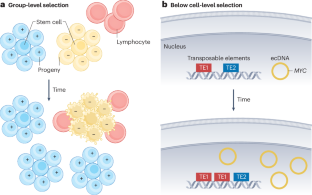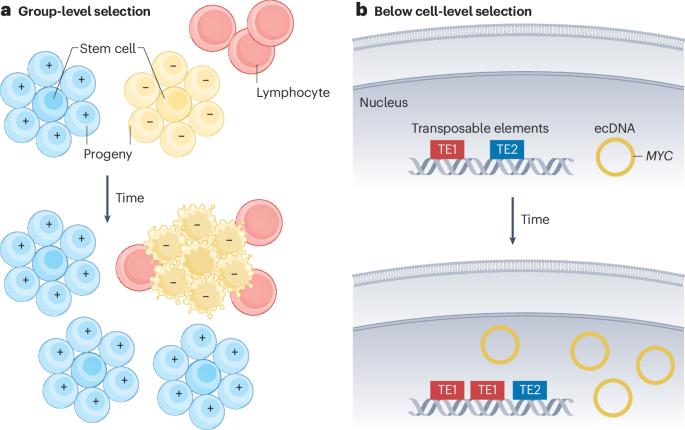癌症进化论:挑战与潜在解决方案
IF 72.5
1区 医学
Q1 ONCOLOGY
引用次数: 0
摘要
癌症的克隆进化模式是在 20 世纪 50-70 年代提出的,主要通过癌症遗传学的研究,在 21 世纪成为癌症生物学的核心。尽管它的价值已经得到了证明,但其结构也受到了表型可塑性、非遗传形式的遗传、克隆适应性的非遗传决定因素以及基因的非树状传递等观察结果的挑战。克隆的定义甚至也存在混乱,我们的目的就是要解决这个问题。克隆进化模型的性能和价值取决于进化过程在癌症中的实证参与程度,以及其解释这些进化过程的理论能力。在此,我们指出了克隆进化模型理论性能的局限性,并提供了克服这些局限性的解决方案。虽然我们并不声称克隆进化可以解释癌症的一切,但我们展示了如何将癌症动力学中已发现的许多复杂性纳入模型,以改善我们目前对癌症的理解。本文章由计算机程序翻译,如有差异,请以英文原文为准。


The evolutionary theory of cancer: challenges and potential solutions
The clonal evolution model of cancer was developed in the 1950s–1970s and became central to cancer biology in the twenty-first century, largely through studies of cancer genetics. Although it has proven its worth, its structure has been challenged by observations of phenotypic plasticity, non-genetic forms of inheritance, non-genetic determinants of clone fitness and non-tree-like transmission of genes. There is even confusion about the definition of a clone, which we aim to resolve. The performance and value of the clonal evolution model depends on the empirical extent to which evolutionary processes are involved in cancer, and on its theoretical ability to account for those evolutionary processes. Here, we identify limits in the theoretical performance of the clonal evolution model and provide solutions to overcome those limits. Although we do not claim that clonal evolution can explain everything about cancer, we show how many of the complexities that have been identified in the dynamics of cancer can be integrated into the model to improve our current understanding of cancer. Clonal evolution is now a central theoretical framework in cancer research. In this Perspective, Laplane and Maley identify challenges to that theory such that some non-evolutionary phenomena in cancer cannot be captured by the theory. They also outline how other challenges, including non-genetic heredity, phenotypic plasticity, reticulate evolution and clone diversity, can be included in an expanded cancer evolutionary theory.
求助全文
通过发布文献求助,成功后即可免费获取论文全文。
去求助
来源期刊

Nature Reviews Cancer
医学-肿瘤学
CiteScore
111.90
自引率
0.40%
发文量
97
审稿时长
6-12 weeks
期刊介绍:
Nature Reviews Cancer, a part of the Nature Reviews portfolio of journals, aims to be the premier source of reviews and commentaries for the scientific communities it serves. The correct abbreviation for abstracting and indexing purposes is Nat. Rev. Cancer. The international standard serial numbers (ISSN) for Nature Reviews Cancer are 1474-175X (print) and 1474-1768 (online). Unlike other journals, Nature Reviews Cancer does not have an external editorial board. Instead, all editorial decisions are made by a team of full-time professional editors who are PhD-level scientists. The journal publishes Research Highlights, Comments, Reviews, and Perspectives relevant to cancer researchers, ensuring that the articles reach the widest possible audience due to their broad scope.
 求助内容:
求助内容: 应助结果提醒方式:
应助结果提醒方式:


